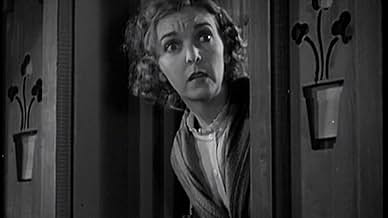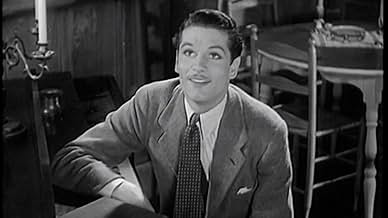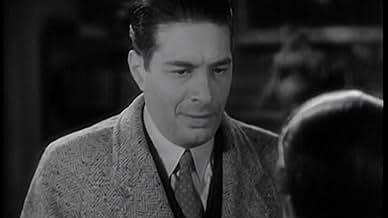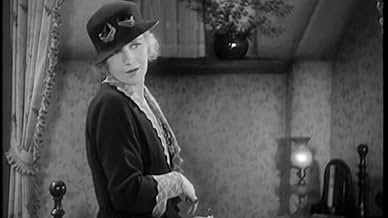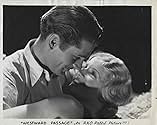A struggling writer divorces his wife to pursue his career without interference, but they meet in Europe years later after she has remarried.A struggling writer divorces his wife to pursue his career without interference, but they meet in Europe years later after she has remarried.A struggling writer divorces his wife to pursue his career without interference, but they meet in Europe years later after she has remarried.
- Director
- Writers
- Stars
Lita Chevret
- Party Guest
- (uncredited)
Joyce Compton
- Lillie
- (uncredited)
Julie Haydon
- Bridesmaid
- (uncredited)
Carl M. Leviness
- Ship Passenger
- (uncredited)
- Director
- Writers
- All cast & crew
- Production, box office & more at IMDbPro
Featured reviews
Studios must have known the value of naming a film correctly, but in the case of Pathe, they called this one Westward Passage, which sounds like a bunch of people on a wagon train.
Actually it's a film about a modern (1932) young married couple, played by Ann Harding and Laurence Olivier.
I thought this might be a play for a couple of reasons. First is the amount of dialogue and secondly, it was third class Noel Coward and probably trying to cash in on Private Lives.
The story concerns a writer, Nicholas (Olivier) who marries Olivia (Ann Harding). It seems as if five minutes after the honeymoon, the two start quarreling on a hourly basis.
They live in a small apartment; Nicholas' publisher is demanding that he change the end of his novel, and he's refusing and loses his temper; and then she hits him up with the fact that she's pregnant, which he wasn't planning on.
Eventually, they divorce. Olivia marries Harry, who adores her and has money, though she's not in love with him. Hers and Nicholas' little girl (Bonita Granville) accompanies her.
A few years later, in Lucerne, Olivia happens by a bookstore selling Nicholas' book, and Nicholas, exiting, hands her a copy. He's now successful and decides he wants her back. He even takes passage (get it? westward passage) on a ship she's traveling on without her husband.
This isn't very good. Olivier, wearing odd eye makeup, hadn't learned acting before the cameras yet, so he's over the top. He wouldn't learn it until Wuthering Heights when, before the cast, he said, "I suppose this anemic little medium can't take great acting," which sent director William Wyler, the cast, and crew into spasms of laughter.
He's high energy, probably trying to cover up for the fact that his part isn't well written. A friend of mine used to take a line from Rebecca, "I hated her," and imitate Olivier, going into falsetto on "hated." Ever since then, I've noticed when Olivier gets excited, his voice goes up an octave at least in his youth.
Ann Harding is lovely. Unfortunately the film is beneath both of them. Olivier was destined to become one of the greatest actors in both theater and film, not to mention one of the most glorious looking. The elegant Harding eventually moved into character roles, working into the 1960s.
These actors are always worth seeing, provided you can make it through this somewhat boring movie.
Actually it's a film about a modern (1932) young married couple, played by Ann Harding and Laurence Olivier.
I thought this might be a play for a couple of reasons. First is the amount of dialogue and secondly, it was third class Noel Coward and probably trying to cash in on Private Lives.
The story concerns a writer, Nicholas (Olivier) who marries Olivia (Ann Harding). It seems as if five minutes after the honeymoon, the two start quarreling on a hourly basis.
They live in a small apartment; Nicholas' publisher is demanding that he change the end of his novel, and he's refusing and loses his temper; and then she hits him up with the fact that she's pregnant, which he wasn't planning on.
Eventually, they divorce. Olivia marries Harry, who adores her and has money, though she's not in love with him. Hers and Nicholas' little girl (Bonita Granville) accompanies her.
A few years later, in Lucerne, Olivia happens by a bookstore selling Nicholas' book, and Nicholas, exiting, hands her a copy. He's now successful and decides he wants her back. He even takes passage (get it? westward passage) on a ship she's traveling on without her husband.
This isn't very good. Olivier, wearing odd eye makeup, hadn't learned acting before the cameras yet, so he's over the top. He wouldn't learn it until Wuthering Heights when, before the cast, he said, "I suppose this anemic little medium can't take great acting," which sent director William Wyler, the cast, and crew into spasms of laughter.
He's high energy, probably trying to cover up for the fact that his part isn't well written. A friend of mine used to take a line from Rebecca, "I hated her," and imitate Olivier, going into falsetto on "hated." Ever since then, I've noticed when Olivier gets excited, his voice goes up an octave at least in his youth.
Ann Harding is lovely. Unfortunately the film is beneath both of them. Olivier was destined to become one of the greatest actors in both theater and film, not to mention one of the most glorious looking. The elegant Harding eventually moved into character roles, working into the 1960s.
These actors are always worth seeing, provided you can make it through this somewhat boring movie.
The trouble with this film is the character played by Laurence Olivier. In the words of other characters in the movie, he is "selfish, self-centered, conceited and egotistical." I would add brash, argumentative and stubborn. In short, I hated his character, which ruined the film for me, even though without those qualities there would not have been a film. Apparently, 1932 audiences agreed with me; Olivier was persona non grata at RKO after this film lost $250,000 at the box office. Olivier went back to England and didn't make another film in America until Wuthering Heights (1939), when his talents were much more appreciated.
Besides being an early film of Olivier, this film is also noted for being the film debut of Bonita Granville, then ten years old. She gives a good performance, and you can see she is a natural born actress. The always lovely Ann Harding is also worth seeing, as well as Florence Lake and Edgar Kennedy, who have a nice bit of comic relief in one short scene aboard ship.
Besides being an early film of Olivier, this film is also noted for being the film debut of Bonita Granville, then ten years old. She gives a good performance, and you can see she is a natural born actress. The always lovely Ann Harding is also worth seeing, as well as Florence Lake and Edgar Kennedy, who have a nice bit of comic relief in one short scene aboard ship.
Ann Harding and Laurence Olivier are madly-in-love newlyweds who run into marital discord when she realizes he's a frustrated writer and a royal jerk. Their decision to have a child only makes things worse, and Olivier eventually abandons them. Harding turns to wealthy suitor Irving Pichel who has always loved her. Several years later, the happily married Harding runs into Olivier again. Now he's a successful writer, and attempts to rekindle their romance.
I watched this for Olivier, and he's terrible here. I'm not sure if the filmmakers wanted his character to come across as a completely repellent lout, but that's how he turned out, obnoxious, irritating and without any real redeeming qualities. I was left wondering what Harding saw in him. Olivier would give up trying to be a Hollywood star not too long after this and turn his attention to the stage where he would build his reputation. That was a good call on his part. However, this film does allow for the unlikely screen teaming of Olivier with Zasu Pitts.
I watched this for Olivier, and he's terrible here. I'm not sure if the filmmakers wanted his character to come across as a completely repellent lout, but that's how he turned out, obnoxious, irritating and without any real redeeming qualities. I was left wondering what Harding saw in him. Olivier would give up trying to be a Hollywood star not too long after this and turn his attention to the stage where he would build his reputation. That was a good call on his part. However, this film does allow for the unlikely screen teaming of Olivier with Zasu Pitts.
This "drama" comes across more as a comedy of manners since a) most of the story concerns the romance between two characters and b) I believe the intent was to focus on the dialogue, especially between those two characters. Released in 1932, "Westward Passage" came not long after the advent of talkies, and I think studios were still learning about the capabilities of scripts not limited by title cards.
Since this film is only 73 minutes in length, the transition between scenes and the passage of time are rather choppy, short-changing what might have been a more interesting story if it were developed more.
The primary characters are Olivia Allen (Ann Harding) and Nick Allen (Laurence Olivier), who we first meet as giggly newlyweds arriving at the inn of Mrs. Truesdale (Zasu Pitts).
Suddenly the newlyweds are dullyweds, living in a cramped flat, dealing with the realities of life. Nick, a writer, feels inhibited by his lifestyle and harangued by his editor, who wants him to add a happy ending to his manuscript. What does this portend for our lovebirds, we might wonder? Suddenly, baby makes three and Nick is thrust into the tedious responsibilities of fatherhood. Ill feelings ensue.
The center of the conflict is Nick's preoccupation with the idea that an artist must live a solitary life to create real art, unhampered by the quotidian aspects of life. At the same time, the Allens love each other. It seems love and art are incompatible.
Nick loses Olivia, then tries to woo her back, quoting "Paradise Lost" and singing "What'll I do". Olivia displays a resolution to always be proper, but her love for Nick--that literary bad boy--is undeniable and, like love sometimes is, unfathomable.
If you are wondering "What'll they do?" and "will paradise be regained?" you will have to watch this film that is very representative of its time, even if it could be much smoother. The dialogue contains some clever lines, but not enough to earn this film high marks.
Since this film is only 73 minutes in length, the transition between scenes and the passage of time are rather choppy, short-changing what might have been a more interesting story if it were developed more.
The primary characters are Olivia Allen (Ann Harding) and Nick Allen (Laurence Olivier), who we first meet as giggly newlyweds arriving at the inn of Mrs. Truesdale (Zasu Pitts).
Suddenly the newlyweds are dullyweds, living in a cramped flat, dealing with the realities of life. Nick, a writer, feels inhibited by his lifestyle and harangued by his editor, who wants him to add a happy ending to his manuscript. What does this portend for our lovebirds, we might wonder? Suddenly, baby makes three and Nick is thrust into the tedious responsibilities of fatherhood. Ill feelings ensue.
The center of the conflict is Nick's preoccupation with the idea that an artist must live a solitary life to create real art, unhampered by the quotidian aspects of life. At the same time, the Allens love each other. It seems love and art are incompatible.
Nick loses Olivia, then tries to woo her back, quoting "Paradise Lost" and singing "What'll I do". Olivia displays a resolution to always be proper, but her love for Nick--that literary bad boy--is undeniable and, like love sometimes is, unfathomable.
If you are wondering "What'll they do?" and "will paradise be regained?" you will have to watch this film that is very representative of its time, even if it could be much smoother. The dialogue contains some clever lines, but not enough to earn this film high marks.
A rich woman encounters her first husband during a WESTWARD PASSAGE across the Atlantic.
RKO Studios joined the lovely Ann Harding and the dynamic young Laurence Olivier in this rather pedestrian little soap opera, which gains its main distinction from its casting. The emotions on display are a bit tawdry at times, but the performances are certainly always entertaining.
Miss Harding, sadly rather obscure today, gives a fine portrayal of a woman slowly unfolding, like a rose, into becoming a successful, vibrant female. Even though she treats her second spouse rather shoddily, the viewer still cares about her and wishes her well. Olivier gives a marvelously hammy performance, full of stagy flourishes & fidgets. Always mindful of the camera, he makes himself a coquette to the viewers, so effortlessly stealing every scene that it's easy to forget just how petty, irresponsible & disreputable his character actually is.
A fine cast of players offer able support: Irving Pichel as Harding's decent, dull second husband; Juliette Compton & Irene Purcell as her wealthy, worldly girlfriends; slow-burning Edgar Kennedy as a henpecked husband aboard ship; Herman Bing as a comic factotum; and little Bonita Granville as the precocious offspring of Harding & Olivier.
Best of all is dear ZaSu Pitts, all fluttery gestures & rolling eyes, as the wonderfully vague proprietress of the quaint honeymoon inn where Olivier takes Harding, twice.
RKO Studios joined the lovely Ann Harding and the dynamic young Laurence Olivier in this rather pedestrian little soap opera, which gains its main distinction from its casting. The emotions on display are a bit tawdry at times, but the performances are certainly always entertaining.
Miss Harding, sadly rather obscure today, gives a fine portrayal of a woman slowly unfolding, like a rose, into becoming a successful, vibrant female. Even though she treats her second spouse rather shoddily, the viewer still cares about her and wishes her well. Olivier gives a marvelously hammy performance, full of stagy flourishes & fidgets. Always mindful of the camera, he makes himself a coquette to the viewers, so effortlessly stealing every scene that it's easy to forget just how petty, irresponsible & disreputable his character actually is.
A fine cast of players offer able support: Irving Pichel as Harding's decent, dull second husband; Juliette Compton & Irene Purcell as her wealthy, worldly girlfriends; slow-burning Edgar Kennedy as a henpecked husband aboard ship; Herman Bing as a comic factotum; and little Bonita Granville as the precocious offspring of Harding & Olivier.
Best of all is dear ZaSu Pitts, all fluttery gestures & rolling eyes, as the wonderfully vague proprietress of the quaint honeymoon inn where Olivier takes Harding, twice.
Did you know
- TriviaTheatrical movie debut of Bonita Granville (Little Olivia Allen (age 10)).
- GoofsNick's telegram congratulating Olivia and Harry on their marriage is dated May 10 1928. Later scenes are supposed to take place six years later, despite the film having been released in 1932.
- ConnectionsReferenced in The Complete Citizen Kane (1991)
- SoundtracksThe Wedding March
(uncredited)
from "A Midsummer Night's Dream"
Music by Felix Mendelssohn
Played by Laurence Olivier on the piano
Details
- Runtime1 hour 13 minutes
- Color
- Aspect ratio
- 1.37 : 1
Contribute to this page
Suggest an edit or add missing content


